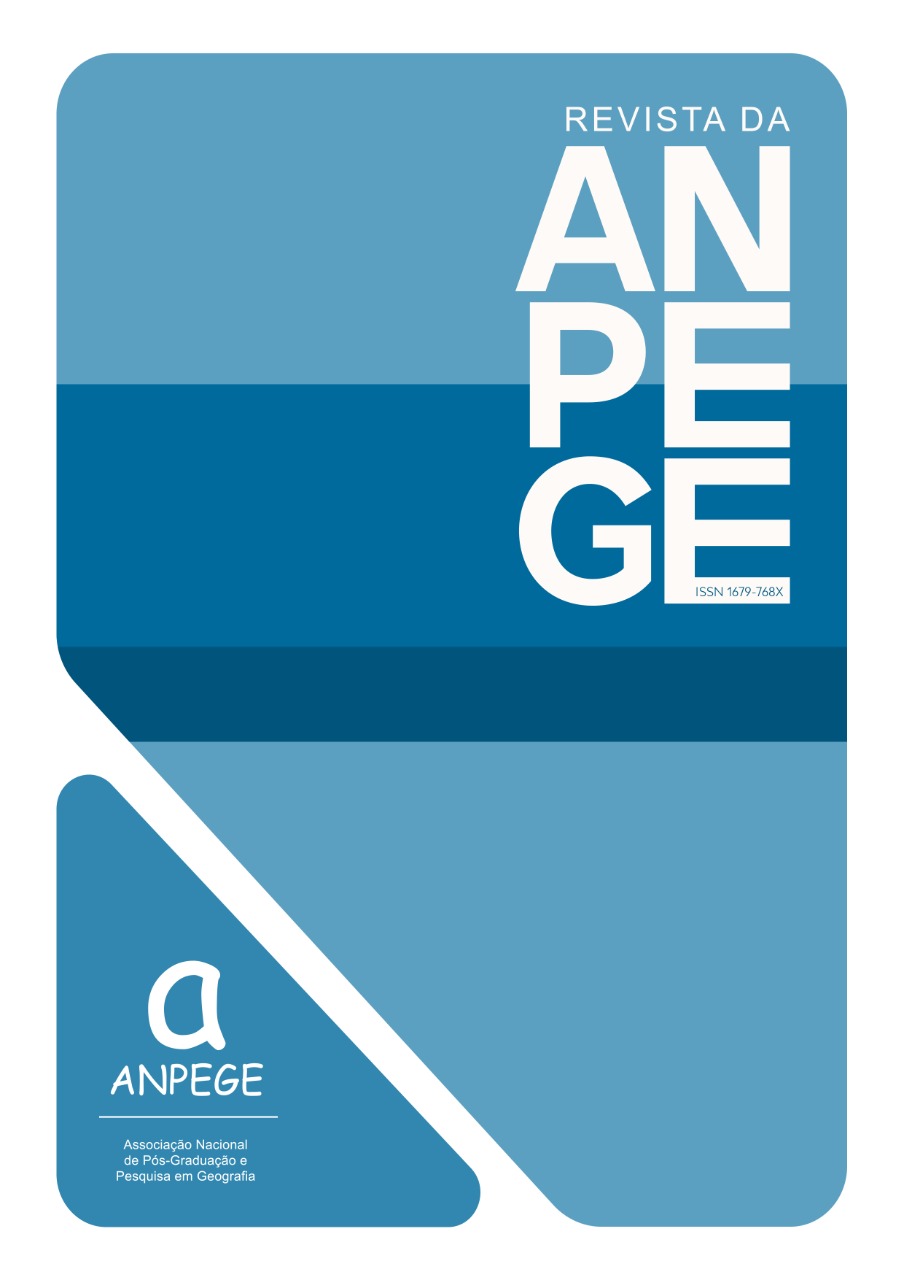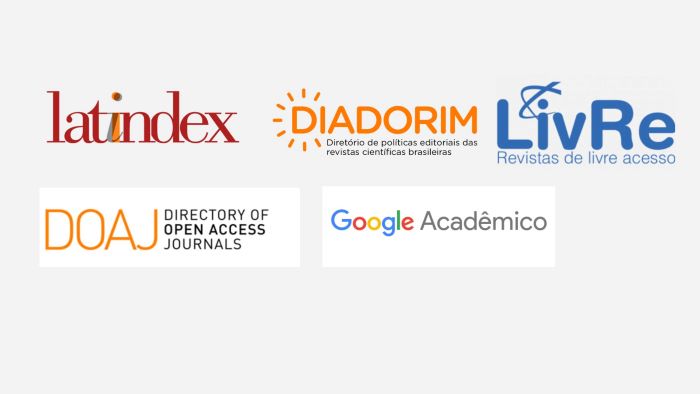SCIENCE, POLICY AND HISTORICAL CLIMATE PRODUCTION: CONSIDERATIONS ON SCIENTIFIC CONTROVERSIES AND POLITICAL FOR CLIMATE CHANGE
considerações sobre controvérsias científicas e políticas para mudanças climáticas
DOI:
https://doi.org/10.5418/ra2022.v18i36.13567Keywords:
clima, história da ciência, política, mudanças climáticas, climate, history of science, politics, climate change, historia de la ciencia, cambio climáticoAbstract
From a critical approach, this article aims to analyze historical aspects of the sciences, specifically those concerned with understanding the climate and its transformations. It seeks to discuss the controversies from different scientific perspectives on climate change, specifically the clash between scientific knowledge located at the center of the discussions (and whose central theory is global warming) and perspectives that start from other assumptions and different ways of think about the phenomenon - for example, those who understand the climate as a historical-geographical phenomenon. The article also makes a reflection on the influences of physical meteorology in the formulation of policies focused on the theme, whose objectives fall in mitigating actions to the detriment of territorial adaptation initiatives.
Downloads
References
BUEDELER, W. El Año Geofísico Internacional. La UNESCO y su Programa. UNESCO: Paris, 1957. Disponível em: <https://unesdoc.unesco.org/ark:/48223/pf0000128396>. Acesso em 04 mai. 2020.
CASTREE, N. Marxism, capitalism, and the production of nature. In: Castree, Noel; Bruce Braun (orgs.) Social nature. Theory, practice, and politics. Oxford: Blackwell Publishing, 2001.
____. The Anthropocene and the environmental humanities: extending the conversation. Environmental Humanities. 5, 2014a. DOI: https://doi.org/10.1215/22011919-3615496
____. The Anthropocene and Geography I: The Back Story. Geography Compass 8, no. 7, 2014b. DOI: https://doi.org/10.1111/gec3.12141
CARVALHO. D. de. Météorologie du Brésil. Oxford: John Bale, Sons & Danielsson, 1917.
CLAVAL, P. Epistemologia da geografia. Florianópolis: Ed. UFSC, 2014. DOI: https://doi.org/10.36403/espacoaberto.2014.2429
COLE, S. Making Science. Between nature and Society. Cambridge: Harvard University Press, 1992.
CORNETTA, A. A financeirização do clima: Uma abordagem geográfica do mercado de carbono e suas escalas de operação. São Paulo: Annablume/Fapesp, 2012.
____. O atual regime político das mudanças climáticas globais e a agroindústria de papel e celulose no Brasil. In: RAMOS, G. C. D.; CORNETTA, A.; DIAZ, B. F. Cambio climático global, transformación agraria y soberanía alimentaria en América Latina. Buenos Aires: CLACSO, 2014.
____. Entre o clima e a terra: uma análise geográfica da “economia de baixo carbono” na Amazônia Legal. 2017. Tese (Doutorado em Geografia Humana). Faculdade de Filosofia, Letras e Ciências Humanas, Universidade de São Paulo, São Paulo, 2017. 429 f.
CRUTZEN, P. J. Geology mankind. Nature. vol. 415, 23. 3 January, 2002. DOI: https://doi.org/10.1038/415023a
CRUTZEN, P.J.; STOMER, E. F. ‘The Antropocene’. Global change newsletter. N. 4, 2000.
DE MARTONNE, E. Traité de Géographie physique. — Climat. — Hydrographie. — Relief du sol. — Biogéographie. Annales de Géographie. 18e Année, N. 102, 15 nov. 1909. DOI: https://doi.org/10.3406/geo.1909.2450
FAGAN. B. O aquecimento global. A influência do clima no apogeu e declínio das civilizações. São Paulo: Larousse, 2009.
HAMMES, D. F. Análise e interpretação ambiental da química iônica de um testemunho do manto de gelo da Antártica ocidental. Dissertação (Mestrado). Universidade Federal do Rio Grande do Sul. Instituto de Geociências. Programa de Pós-Graduação em Geociências. Porto Alegre, 2011.
HUNT, J.C.R. Lewis Fry Richardson and his contribution to mathematics, meteorology, and models of conflicts. Annual Reviews. Fluid Mech. n. 30: xiii-xxxvi. London: University College London, 1998. DOI: https://doi.org/10.1146/annurev.fluid.30.1.0
HUNTINGTON, E. The Adaptability of the White Man to Tropical America. The Journal of Race Development. Vol. 5, No. 2, oct. 1914. pp. 185-211. DOI: https://doi.org/10.2307/29738039
INTERGOVERNMENTAL PANEL ON CLIMATE CHANGE (IPCC). Introducción a los modelos climáticos simples utilizados en el segundo informe de evaluación del IPCC. Documento técnico IPCC. fev, 1997. Disponível em: <https://www.ipcc.ch/pdf/technical-papers/paper-II-sp.pdf>.
____. Climate Change 2007 – The Physical Science Basis Summary for Policymakers. Contribution of Working Group I to the Fourth Assessment Report of the Intergovernmental Panel on Climate Change. Paris: 10th Session of Working Group I of the IPCC, February, 2007. Disponível em: <http://www.ipcc.ch/pdf/assessment-report/ar4/wg1/ar4-wg1-spm.pdf>.
____. Working Group I contribution to the IPCC 5th Assessment. Report “Climate Change 2013: The Physical Science Basis. Cambridge, United Kingdom and New York, NY, USA: Cambridge University Press, 2013. Disponível em: <http://www.ipcc.ch/report/ar5/wg1/#.umlE63vFovk>.
____. Climate Change 2014: Impacts, Adaptation, and Vulnerability. Part A: Global and Sectoral Aspects. Contribution of Working Group II to the Fifth Assessment Report of the Intergovernmental Panel on Climate Change. Cambridge, United Kingdom and New York, NY, USA: Cambridge University Press, 2014. Disponível em: <http://www.ipcc.ch/pdf/assessment-report/ar5/wg2/WGIIAR5-PartA_FINAL.pdf>.
____. Climate Change 2014: Mitigation of Climate Change. Contribution of Working Group III to the Fifth Assessment Report of the Intergovernmental Panel on Climate Change. Cambridge, United Kingdom and New York, NY, USA: Cambridge University Press, 2014a. Disponível em: <http://www.ipcc.ch/pdf/assessment-report/ar5/wg3/ipcc_wg3_ar5_full.pdf>.
____. Climate Change 2014: Impacts, Adaptation, and Vulnerability. Part B: Regional Aspects. Contribution of Working Group II to the Fifth Assessment Report of the Intergovernmental Panel on Climate Change. Cambridge, United Kingdom and New York, NY, USA: Cambridge University Press, 2014b. Disponível em: <http://www.ipcc.ch/pdf/assessment-report/ar5/wg2/WGIIAR5-PartB_FINAL.pdf>.
KNORR-CETINA, K. La fabricación del conocimiento. Un ensayo sobre el carácter constructivista y contextual de la ciencia. Buenos Aires: Universidad Nacional de Quilmes Editorial, 2005.
LATOUR, B.; WOOLGAR, S. Laboratory life: the construction of scientific facts. Princeton: Princeton University Press, 1979.
LATOUR, B. Políticas da natureza: como fazer ciência na democracia. Bauru, SP: EDUSC, 2004.
LOIOLA, S. A. Variabilidade paleoclimática e a evolução de sistemas complexos adaptativos nos humanos modernos. Tese (Doutorado em Geografia) - Universidade Federal de Goiás, Goiânia, 2014. MANN, M. E.; BRADLEY, R. S.; HUGUES, M. K. Global-scale temperature patterns and climate forcing over the past six centuries. Nature. vol. 392. 1998. Disponível em: <https://www.nature.com/articles/33859 >. DOI: https://doi.org/10.1038/33859
MONTEIRO, C. A. F. de. Análise rítmica em climatologia. Problemas da atualidade climática em São Paulo e achegas para um programa de trabalho. Climatologia n° 1, São Paulo: Instituto de Geografia da USP, 1971.
____. Clima e excepcionalismo. Florianópolis: Editora da UFSC, 1991.
MORAES, A. C. R. Geografia. Pequena história crítica. São Paulo: Hucitec, 1988.
____. Ideologias geográficas. São Paulo: Hucitec, 1999.
MOREIRA, R. O pensamento geográfico brasileiro. As matrizes brasileiras. Vol. 3. São Paulo: Contexto, 2010.
NUNES, A. M. B. Inicialização física em modelos de previsão de tempo e estudo de seus efeitos na participação de energia em modos verticais e horizontais nos trópicos e na América do Sul. Tese (Doutorado em Meteorologia). Instituto Nacional de Pesquisas Espaciais (INPE), São José dos Campos, 2002.
PEET, R.; ROBBINS, P.; WATTS, M. Global Nature. In: PEET, R.; ROBBINS, P.; WATTS, M. (orgs.) Global Political Ecology. Routledge: New York, 2011. DOI: https://doi.org/10.4324/9780203842249
PEIXOTO, A. Clima e saúde. Introdução bio-geografica à civilização brasileira. Coleção Brasiliana. São Paulo, Editora Nacional, [1938], 1975.
POPPER, K. R. Lógica da pesquisa científica. São Paulo: Edusp, 1985.
RICHARDSON, L. F. Weather prediction by numerical process. Cambridge: Cambridge Univ. Press, 1922.
ROCKSTRÖM, J. et al. Planetary boundaries: exploring the safe operating space for humanity. Ecology and Society, v. 14, n. 2, p. 32. 2009. Disponível em: <http://www.ecologyandsociety.org/vol14/iss2/art32/>.
SANT’ANNA NETO, J. L. História da Climatologia no Brasil: gênese, paradigmas e a construção de uma Geografia do Clima. (Tese de Livre-Docência). Presidente Prudente: FCT/UNESP, 2001.
____. História da Climatologia no Brasil: Gênese e paradigmas do clima como fenômeno geográfico. Cadernos Geográficos da Universidade Federal de Santa Catarina. n.7. Florianópolis: Imprensa Universitária. 2004.
SORRE, M. Les fondements de la géographie humaine. Paris: Librairie Armand Colin, 1951.
____. Traité de climatologie biologique et médicale. In: MASSON, M. P. Paris: Cie Éditeurs. Vol. I, pp. 1 – 9, 1934. Traduzido por José Bueno Conti. Departamento de Geografia/ FFLCH/USP. Revista do Departamento de Geografia, 18, 2006. pp. 89-94.
TADDEI, R. Meteorologistas e profetas da chuva. Conhecimentos, práticas e políticas da atmosfera. São Paulo: Terceiro nome, 2017.
ULLOA, A. Perspectivas culturales del clima. Bogotá: Universidad Nacional de Colombia. Facultad de Ciencias Humanas. Departamento de Geografía, 2011.
UNITED NATIONS. ENVIRONMENT PROGRAMME ENVIRONMENT FOR DEVELOPMENT (UNEP). Climate Change Mitigation. s/d. Disponível em: <https://www.unenvironment.org/explore-topics/climate-change/what-we-do/mitigation >.
VEYRET, Y. Os Riscos: o homem como agressor e vítima do meio ambiente. São Paulo: Contexto, 2007.
ZAVATTINI, J. A. A produção brasileira em climatologia: o tempo e o espaço nos estudos do ritmo climático. Terra Livre. n. 20., 2003.
____. Dinâmica atmosférica e análise rítmica: a contribuição do brasileiro Carlos Augusto Figueiredo Monteiro à França de Pédelaborde e à Itália de Pinna. In: MONTEIRO, C. A. F.; et al. (orgs.) A construção da climatologia geográfica no Brasil. Campinas: Alínea, 2015.
Downloads
Published
How to Cite
Issue
Section
License
Autores que publicam nesta revista concordam com os seguintes termos:Autores mantêm os direitos autorais e concedem à revista o direito de primeira publicação, com o trabalho simultaneamente licenciado sob a Creative Commons Atribuição-NãoComercial-CompartilhaIgual 3.0 Brasil que permitindo o compartilhamento do trabalho com reconhecimento da autoria do trabalho e publicação inicial nesta revista.
Autores têm autorização para assumir contratos adicionais separadamente, para distribuição não exclusiva da versão do trabalho publicada nesta revista (ex.: publicar em repositório institucional ou como capítulo de livro), com reconhecimento de autoria e publicação inicial nesta revista.
Autores têm permissão e são estimulados a publicar e distribuir seu trabalho online (ex.: em repositórios institucionais ou na sua página pessoal) a qualquer ponto antes ou durante o processo editorial, já que isso pode gerar alterações produtivas, bem como aumentar o impacto e a citação do trabalho publicado (Veja O Efeito do Acesso Livre em http://opcit.eprints.org/oacitation-biblio.html.)
Authors who publish with this journal agree to the following terms:
Authors retain copyrights and grant the Journal the right of first publication with the work simultaneously licensed under a Creative Commons Atribuição-NãoComercial-CompartilhaIgual 3.0 Brasil that allows others to share the work with an acknowledgement of the work's authorship and initial publication in this Journal.
Authors are permitted to enter into separate, additional contractual arrangements for the non-exclusive distribution of the Journal's published version of the work (e.g., post it to an institutional repository or in a book chapter), with an acknowledgement of authorship and initial publication in this journal.
Authors are permitted and encouraged to publish and share their work online (e.g., in institutional repositories or on their website) prior to and during the submission process, as it can lead to productive exchanges, as well as increase the impact and citation of published work (See The Effect of Open Access - http://opcit.eprints.org/oacitation-biblio.html.)




